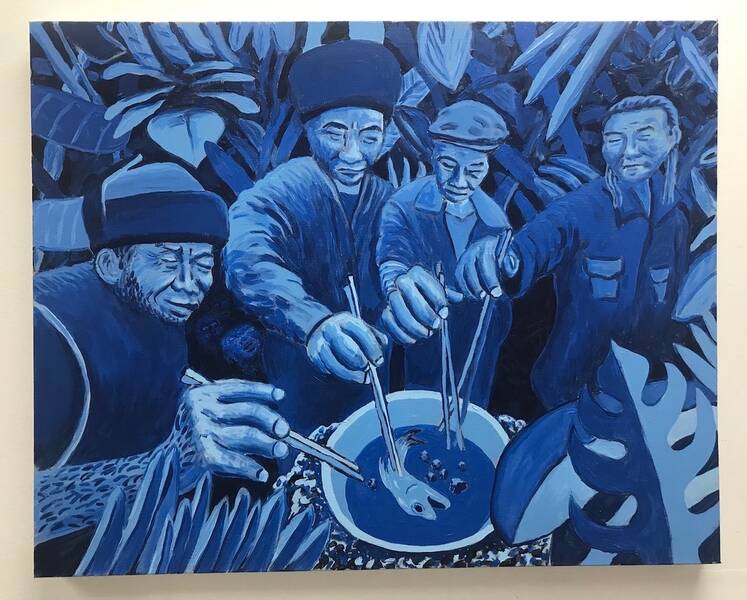faculty / college-news / humanities-and-sciences
September 16, 2020
By Anna Macaulay
New Humanities and Sciences classes provide major support for minor concentrations
For some ArtCenter students, a temporary shift to online learning is providing the perfect opportunity to complete their Humanities and Sciences (H&S) requirements. In a very ArtCenter way, the H&S department has met the challenge, seized the opportunity, and is offering a handful of new innovative courses that will allow students to stretch their minds, acknowledge the challenges of our times and round out their education. It’s also a great time to consider obtaining a minor in one of the four areas now being offered through H&S: Business, Creative Writing, Material Science and Research.
One thing we have learned from the global pandemic is that we are all connected on this small planet. Professor Steve Gavenas planned to offer his new course, The Global Economy—Workings, Trends, and Challenges, before the COVID-19 outbreak, thinking that understanding how the world economy functions would be tremendously valuable knowledge for anyone working as a freelancer, small businessperson, entrepreneur or creative worker in a company. The course has become more relevant as the pandemic has driven home the need to think globally and the Black Lives Matters movement is shining a spotlight on income inequality. Gavenas will use current events to help examine the challenges created by recent trends in the capitalist system.

I create works that operate in narrative sequence, telling stories of ambivalence about American imperialism and personal isolation and exploration, based on my experiences.
Steven GavenasH&S faculty
ArtCenter is probably not the only place you can take an economics class from a practicing artist, but it’s probably the place you are most likely to find an instructor who has this unique combination of education, experience and interest. Gavenas initially went to college to study art, then pivoted to business after traveling the world, earning a degree in economics and then an MBA from Cornell University. He maintained an artistic practice while working in the corporate world and returned to college to study art once again, eventually earning an MFA from ArtCenter. Currently a practicing artist and sometime business consultant, Gavenas relates, “As an alum, a creative worker, a trained economist, and a long-time businessperson, I think I bring some good insights to helping students learn the basics of business economics and global economic policy. Business is creative, and there’s a business side to creativity!”
The Global Economy: Workings, Trends and Challenges is being offered Thursdays, 9–11:50 a.m., online only, for the Fall 2020 term. It can be used to satisfy a requirement for the new Business minor. Gavenas also teaches Business and Economics, which is a Business Minor requirement.
Other new H&S classes this Fall include History and Theory of the Built Environment, Ceramic Worlds of China, Critical Histories 1, Comics and Zines: Curation, Conversation, Community, Art & Architecture on Film, Girl Power in Myth and Media, Crafting Beginnings, Middles, and Ends, Intimacy and Alienation: Reading Chekhov and Brecht, The Art of Gentrification, Introduction to Research, The Visual Narrative Against the Grain: Artist as Activist, GRID: CogSci + Spatial Design, Turing Machines & Game Theory, Biopolitics and On Growth and Form.
In addition to offering relevant courses that will inform your creative practice, the H&S department now offers the opportunity to earn a minor in one of four concentrations. The H&S minors offer students a way to organize their classes to target an area of interest. They also point to the breadth of an ArtCenter education for future employers, reminding them that students learn more than how to use a laser cutter. The requirements for each minor will not prolong the time it takes a student to earn a degree. They can tailor their class selection to satisfy minor requirements with no additional credits, classes or costs.
A Business minor provides immersion in the language and strategy of business, supports the development of creative entrepreneurship and offers a creative perspective on real world business solutions.
The Creative Writing minor provides an expanded understanding of a variety of narrative and lyrical forms and their potential applications, and develops the visual artists’ understanding and mastery of a different creative artform that often supports and expands one’s studio practice.
The Material Science minor provides a fundamental understanding of materials science, engineering basics and allows students to identify the major properties of all classes of industrial and design materials, as well as have working exposure to the newest classes of materials, including nanomaterials, biomaterials and advanced composites.
The Research minor explores a range of methods, research ethics, fieldwork practices, participatory approaches and critical making. Recommended for students interested in working in design research, design strategy and advanced concept design studios.
Current students are invited to contact the Humanities and Sciences Department to apply for any of these minors. Over a hundred students are already enrolled!

















